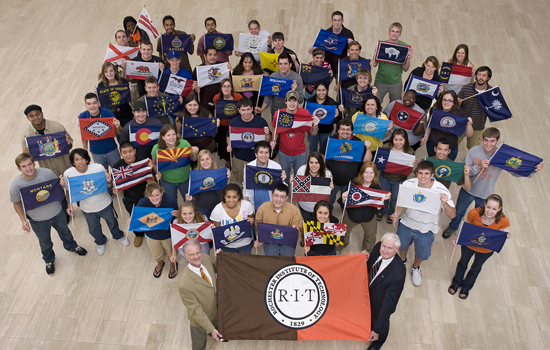NTID Sets Enrollment Record
Students come from all 50 states and beyond
Mark Benjamin
A record 1,450 students—some seen here, from all 50 U.S. states and the District of Columbia, plus international locales—are enrolled this year at the NTID.
More educational options exist for deaf and hard-of-hearing students than ever before, yet the college destination of choice for a record number of students is the National Technical Institute for the Deaf, a college of Rochester Institute of Technology.
This year, NTID’s enrollment is 1,450 students, shattering its record of 1,358 students in 1984. The previous record was the result of a high number of deaf children born to women in the mid-1960s who contracted rubella during their pregnancies. Enrollment has surpassed 1,000 since the early 1980s.
Last fall there were 1,343 NTID students – either enrolled in courses at NTID or who received access services from NTID while attending other colleges at RIT. Two math and two English teachers were hired this year to help accommodate the increased enrollment.
The American with Disabilities Act of 1990 requires colleges to provide access services to students as needed. But that can be challenging in areas with few qualified interpreters, captionists or note takers.
“The numbers are proof that RIT/NTID remains a popular option for deaf and hard-of-hearing students who desire a quality education,” says NTID President Alan Hurwitz. “The continued success of our students speaks for itself.”
Hurwitz said requirements to attend NTID were not lowered to allow more students; admission in some programs was even more restrictive this year. Hurwitz said applications to NTID remain strong, retention rates have improved in recent years and some programs have expanded to accommodate more students.
He also credits NTID’s outreach programs for spreading the word about RIT/NTID. Historically, deaf students going to college often came from schools for the deaf. Today, most students come from mainstreamed schools. The college advertises and holds summer camps for middle and high school students to have them get a taste of college life. Many of those students end up attending RIT/NTID. NTID was created by Congress in 1965 to offer technical education to college students who are deaf or hard of hearing. Its first class of 70 students arrived on the RIT campus in 1968.
This year’s students come from every state in the U.S., as well as Washington D.C., the U.S. Virgin Islands, Guam and several foreign countries including Bulgaria, China, India and Canada.
NTID’s 1,450 students this year include 1,212 undergraduates, 103 graduate students and 135 hearing students in its sign language interpreting program, the oldest and largest interpreter training program in the country.
RIT/NTID employs 570 people; more than 120 of them are interpreters, who work in classrooms and attend events to ensure accessibility. Last year, 110,840 hours of interpreting were provided. In addition, 55 captionists provided 15,440 hours of service. Several dozen tutors and note takers are also available for students needing those services.
RIT is internationally recognized as a leader for providing computing, engineering, imaging technology and fine and applied arts programs, and for providing unparalleled support services for students with hearing loss. The NTID students study, live and socialize with more than 15,000 hearing students on RIT’s Rochester, N.Y. campus. Visit: the National Technical Institute of the Deaf website.




